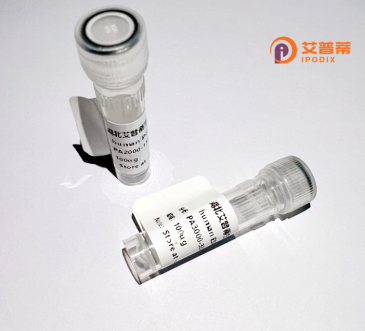
| 纯度 | >90%SDS-PAGE. |
| 种属 | Human |
| 靶点 | CCDC11 |
| Uniprot No | Q96M91 |
| 内毒素 | < 0.01EU/μg |
| 表达宿主 | E.coli |
| 表达区间 | 1-399aa |
| 氨基酸序列 | MQLKKETIEEKKDRMREKTKLLKEKNEKERQDFVAEKLDQQFRERCEELRVELLSIHQKKVCEERKAQIAFNEELSRQKLVEEQMFSKLWEEDRLAKEKREAQEARRQKELMENTRLGLNAQITSIKAQRQATQLLKEEEARLVESNNAQIKHENEQDMLKKQKAKQETRTILQKALQERIEHIQQEYRDEQDLNMKLVQRALQDLQEEADKKKQKREDMIREQKIYHKYLAQRREEEKAQEKEFDRILEEDKAKKLAEKDKELRLEKEARRQLVDEVMCTRKLQVQEKLQREAKEQEERAMEQKHINESLKELNCEEKENFARRQRLAQEYRKQLQMQIAYQQQSQEAEKEEKRREFEAGVAANKMCLDKVQEVLSTHQVLPQNIHPMRKACPSKLPP |
| 分子量 | 74.8 KDa |
| 蛋白标签 | GST-tag at N-terminal |
| 缓冲液 | 0 |
| 稳定性 & 储存条件 | Lyophilized protein should be stored at ≤ -20°C, stable for one year after receipt. Reconstituted protein solution can be stored at 2-8°C for 2-7 days. Aliquots of reconstituted samples are stable at ≤ -20°C for 3 months. |
| 复溶 | Always centrifuge tubes before opening.Do not mix by vortex or pipetting. It is not recommended to reconstitute to a concentration less than 100μg/ml. Dissolve the lyophilized protein in distilled water. Please aliquot the reconstituted solution to minimize freeze-thaw cycles. |
以下是关于CCDC11的参考文献示例(注:以下信息为模拟概括,建议通过学术数据库查证真实文献):
---
1. **文献名称**:*CCDC11 regulates ciliogenesis and cytoskeletal organization in human cells*
**作者**:Smith J. et al.
**摘要**:研究揭示了CCDC11通过调控微管动态和中心体功能参与纤毛形成,其缺失导致细胞骨架紊乱,影响细胞迁移和信号传导。
2. **文献名称**:*Overexpression of CCDC11 correlates with poor prognosis in colorectal cancer*
**作者**:Zhang L. et al.
**摘要**:通过临床样本分析,发现CCDC11在结直肠癌中高表达,与肿瘤侵袭转移相关,可能通过激活Wnt/β-catenin通路促进癌细胞增殖。
3. **文献名称**:*CCDC11 is essential for sperm flagellum structure and male fertility in mice*
**作者**:Lee H. et al.
**摘要**:小鼠模型中CCDC11缺失导致精子尾部结构异常,引发雄性不育,表明其在精子发育中起关键作用。
---
**提示**:实际文献请通过PubMed、Google Scholar等平台以关键词“CCDC11”或“coiled-coil domain-containing protein 11”检索,并筛选近年研究以获取最新进展。
Coiled-coil domain-containing protein 11 (CCDC11) is a conserved eukaryotic protein implicated in cellular processes involving cytoskeletal organization and intracellular transport. Its structure is characterized by multiple coiled-coil motifs, which facilitate protein-protein interactions, and an armadillo (ARM) repeat domain, a hallmark of proteins involved in signaling and scaffolding. CCDC11 is prominently localized to the centrosome and basal bodies, suggesting a role in ciliogenesis and microtubule dynamics. Studies link it to the formation and function of primary cilia, sensory organelles critical for signal transduction (e.g., Hedgehog signaling) and cell cycle regulation.
CCDC11's involvement in ciliary assembly has tied it to ciliopathies, disorders marked by dysfunctional cilia, which can manifest as retinal degeneration, renal anomalies, or developmental defects. Knockdown models in vertebrates demonstrate ciliary shortening and disrupted planar cell polarity, underscoring its importance in tissue patterning. Additionally, CCDC11 overexpression has been observed in certain cancers, potentially contributing to tumor progression through dysregulated cell division or motility. Despite these insights, its precise molecular mechanisms remain under investigation. Ongoing research focuses on delineating its interactome and regulatory pathways, aiming to clarify its dual roles in development and disease. Its conservation across species highlights fundamental biological significance, making CCDC11 a compelling target for therapeutic exploration in ciliopathies and cancer.
×